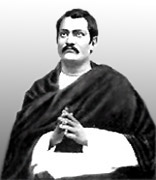 On the lines of Brahmo Samaj and under the inspiration of its very dynamic leader K.C.Sen, Dr. Atmaram Pandurang founded Samaj known as Prarthana Samaj which means Community wedded to prayerful worship of One True God. Like Sen`s Samaj, it believed in the Unity of God and denounced idolatry as a special sin. But it did not abandon Hindu practices nor it advocated definite exclusion of idolatry or abolition of castes. It was confined to a small group of intellectuals who were advocates of reforms of the social system of the Hindus.
On the lines of Brahmo Samaj and under the inspiration of its very dynamic leader K.C.Sen, Dr. Atmaram Pandurang founded Samaj known as Prarthana Samaj which means Community wedded to prayerful worship of One True God. Like Sen`s Samaj, it believed in the Unity of God and denounced idolatry as a special sin. But it did not abandon Hindu practices nor it advocated definite exclusion of idolatry or abolition of castes. It was confined to a small group of intellectuals who were advocates of reforms of the social system of the Hindus.
Prarthana Samaj is milder and less radical in its principles. Theistic worship comes first, followed closely by social reform - the abandonment of caste, widow-remarriage, female education, and the abolition of child-marriage. Many members hold the view that definite beliefs and theological thought are not necessary for a free theistic movement. Others have produced theological and devotional books. Though their theism is based on ancient Hindu texts, they have practically given up the inspiration of the Vedas and belief in transmigration.
History
Two secret societies preceded the Prarthana Samaj. The Paramahamsa Sabha established by Ram Balkrishna Jaykar and others followed this in 1849. Members had to eat bread baked by Christian and drink water brought by a Moslem. Orthodox opposition resulted in the documents being stolen in 1860 and the names of the members being made public. This caused panic. Some members became Christian, while others held to their convictions. Those who held to their convictions became the founders of the Prarthana Samaj in Bombay in 1867. These were educated Indians from Bombay and their leader was Dr. Atmaram Pandurang (1823-1898), a personal friend of Dr. Wilson, founder of Wilson College in 1835.
The Brahmo Samaj made an important impression on these men. In 1872 one of the great Brahmo, Pratap Chandra, stayed for six months at the invitation of the Prarthana Samaj. During his visit there was a plan to make Prarthana Samaj a branch of Brahmo Samaj. This was prevented by Mahadeo Ranade pointing out the splits among the Brahmos of Bengal that might be echoed in Bombay, while Dr. Bhandarkar did not approve of the extremism and Christian bias of Keshub. Similarly, when Dayanand came to Bombay in 1874, there was great interest in his lectures and the next year he founded the Arya Samaj in Bombay. However, his ideas on the Vedas stopped the Prarthana Samaj from joining him.
So the Prarthana Samaj continued as an independent reform movement. In Bombay this was the most important and well-organized movement of the time, being sponsored by leaders of society. P.C.Mazoomdar came from Calcutta in 1872 for six months and increased the worshippers, started night schools for workers, and also a journal, the Subodh Patrika. Their own building was erected in 1874 at Girgaum, Bombay.
The mildness of the Prarthana Samaj has meant that there have never been groups of missionaries as in the Brahmo Samaj. With only one or two missionaries the movement has not spread widely. However, the mildness of the Samaj has been attractive in the South, in Andhra Pradesh and Tamil Nadu, where the Prarthana Samaj is the most popular of the Samajas.
The Samaj runs the Young Theists Union, the Postal Mission to send religious literature, the Subodh Patrika, night schools, and a Ladies Association. It is also associated with The Students Brotherhood, an Orphanage and Foundling Asylum in Pandharpur, and the organization of the Social Reform Movement and the Depressed Classes Mission. Every year both the Brahmo and Prarthana Samajas attend an All-India Theistic Conference.
The Samaj defines its faith as:
1. God is the creator of this universe. He is the only true God; there is no other God beside him. He is eternal, spiritual, infinite, the store of all good, all joy, without parts, without form, one without a second, the ruler of all, all-pervading, omniscient, almighty, merciful, all-holy and the saviour of sinners.
2. His worship alone leads to happiness in this world and the next.
3. Love and reverence for him, an exclusive faith in him, praying and singing to him spiritually with these feelings and doing the things pleasing to him constitute His true worship.
4. To worship and pray to images and other created objects is not a true mode of divine adoration.
5. God does not incarnate himself and there is no one book which has been directly revealed by God or is wholly infallible.
6. All men are His children; therefore they should behave towards each other as brethren without distinction.
7. This is pleasing to God and constitutes man`s duty.
This doctrine was very similar to the Brahmo Samaj but with one significant difference. The Prarthana Samaj bases its worship on the devotional poems of the Vitthalas, especially those of Tukaram. The Vitthalas or Varkari Panth, `pilgrim`s path,` is the cult of Vitthala, the Vaishnava bhakti devotional movement that rose in the thirteenth century and is centered on Pandharpur in the far south of Maharashtra.
Though the Prarthana Samaj is opposed to image-worship, in practice members follow the ceremonies of Hinduism though regarding them as of no religious importance. Thus Samaj members can still practice image-worship in their homes and be part of the caste system. It is said that the Prarthana Samaj pays allegiance to Hinduism with a protest. Their own services use hymns of the old Maratha poet-saints, especially Tukaram.






































